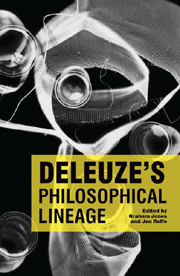Book contents
- Frontmatter
- Contents
- Acknowledgements
- List of Abbreviations
- Introduction: Into the Labyrinth
- 1 Plato
- 2 John Duns Scotus
- 3 G. W. F. Leibniz
- 4 David Hume
- 5 Immanuel Kant
- 6 Solomon Maimon
- 7 G. W. F. Hegel
- 8 Karl Marx
- 9 Hoëne Wronski and Francis Warrain
- 10 Bernhard Riemann
- 11 Gabriel Tarde
- 12 Sigmund Freud
- 13 Henri Bergson
- 14 Edmund Husserl
- 15 A. N. Whitehead
- 16 Raymond Ruyer
- 17 Martin Heidegger
- 18 Pierre Klossowski
- 19 Albert Lautman
- 20 Gilbert Simondon
- Bibliography
- Notes on Contributors
- Index
5 - Immanuel Kant
Published online by Cambridge University Press: 12 September 2012
- Frontmatter
- Contents
- Acknowledgements
- List of Abbreviations
- Introduction: Into the Labyrinth
- 1 Plato
- 2 John Duns Scotus
- 3 G. W. F. Leibniz
- 4 David Hume
- 5 Immanuel Kant
- 6 Solomon Maimon
- 7 G. W. F. Hegel
- 8 Karl Marx
- 9 Hoëne Wronski and Francis Warrain
- 10 Bernhard Riemann
- 11 Gabriel Tarde
- 12 Sigmund Freud
- 13 Henri Bergson
- 14 Edmund Husserl
- 15 A. N. Whitehead
- 16 Raymond Ruyer
- 17 Martin Heidegger
- 18 Pierre Klossowski
- 19 Albert Lautman
- 20 Gilbert Simondon
- Bibliography
- Notes on Contributors
- Index
Summary
In his popular work, Modern French Philosophy, Vincent Descombes opens the section on Gilles Deleuze with the statement: ‘Gilles Deleuze is above all a post-Kantian.’ In justifying this claim he identifies three main areas of contention shared between Deleuze and ‘the great Chinaman of Künigsberg’, which will also form the main threads of the examination of the relationship presented here. The first is their rejection of the idea that thought requires a transcendent entity (the soul, the world, God) to serve as its foundation: ‘No experience can justify us in affirming a single substantial self, a totality of things and a first cause of this totality.’ The second is their emphasis on the active and autonomous nature of thought, substituting a practical ideal of thought as a form of determination for a speculative one based on representation: ‘Liberation of the will is the significance of the critical idea … Deleuze gives the name “philosophy of being” to the old, pre-Kantian metaphysics, and “philosophy of will” to the metaphysics born of the accomplished critique.’ Third, they identify the true problem of ‘difference’ as the difference between a conceptual order and a non-conceptual one rather than the difference between two concepts or identities: the one which obliges thought to introduce difference into its identities, particularity into its general representations, and precision into its concepts. The real difference is that which exists between concept and intuition, between the intelligible and the sensible, between the logical and the aesthetic.
- Type
- Chapter
- Information
- Deleuze's Philosophical Lineage , pp. 87 - 103Publisher: Edinburgh University PressPrint publication year: 2009



